Trouble brews again in Chur diocese
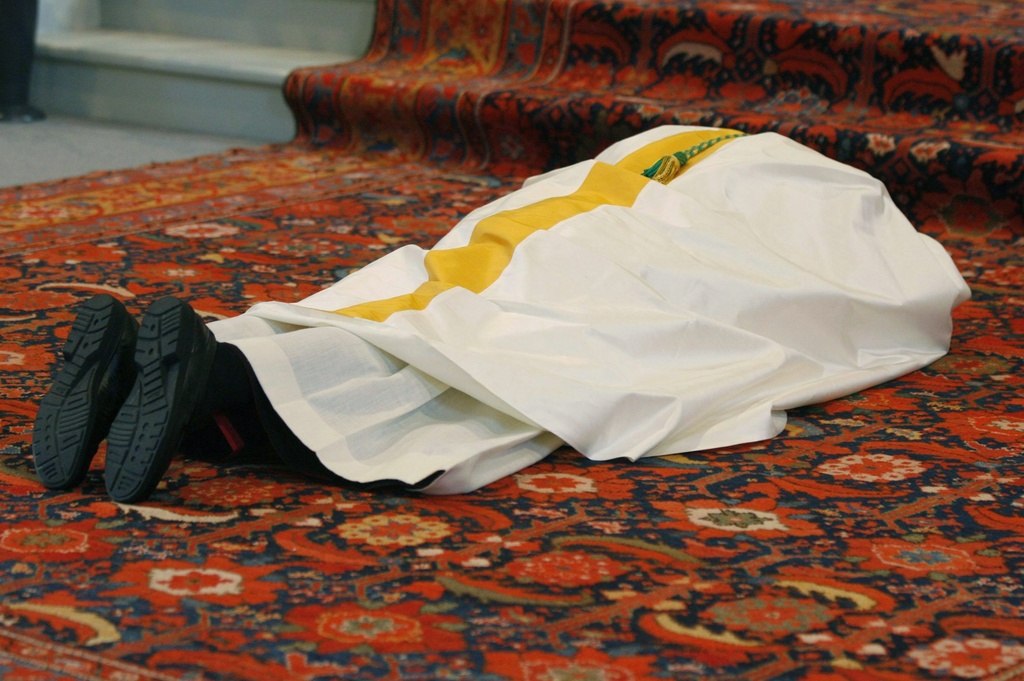
The Roman Catholic bishop of Chur appears to be on a collision course with some lay members of his Church over the rumoured appointment of a controversial auxiliary.
Disputes between bishop and flock are nothing new in Chur: in the 1990s conservative bishop Wolfgang Haas clashed with the more progressive members of the Church over what they saw as his attempts to retreat from modernisations introduced in the 1960s.
That dispute was temporarily solved when Haas was moved to Liechtenstein. But the current bishop, Vitus Huonder, shares the same attitudes as Haas.
Things took a new turn after Huonder went to Rome this summer, where he is thought to have proposed the controversial Martin Grichting to the pope as a second auxiliary bishop.
Although this has not been confirmed, and Grichting himself has said his future is completely open, the Biberbrugg conference, which brings together the lay members of the cantonal churches in the Chur diocese, has come out publicly against his nomination.
“Our verbal and written expressions of concern fell on deaf ears,“ the president of the conference, Werner Inderbitzen, told swissinfo.ch, explaining why his group had gone public about its concerns.
If Grichting becomes auxiliary bishop, he will have to take into account the fact that he is not welcome in many parishes, Inderbitzen said. “We want to prevent the same situation that we had at the time of Bishop Haas, which split the bishopric.“
Contradictions
At the heart of the matter are two different sources of administrative authority within the Roman Catholic church.
The Roman Catholic church in Switzerland has two competing legal structures. One is the secular law governing church-state relations, and the other is the church’s own canonical structure.
This dual structure, which exists only in Switzerland, means that each side has constraints on its powers. The way this plays out varies from canton to canton.
Grichting wants more power for the bishop’s ordinariate – the organ through which the bishop exercises his authority – say his critics. He is a clear opponent of the Church bodies which are democratically elected by lay believers.
In 1997 Grichting wrote a dissertation about the relationship between church and state, taking canton Zurich as his example.
His thesis at that time was that the law governing the relations between church and state turns on its head the relationship envisaged under church law. Instead of the bishop being supported by [lay] advisory councils, it should be he who gives advice to the lay council.
The current state of affairs contradicts the understanding of the bishop’s office “that has existed since the time of the early Church“, Grichting wrote.
The role of the laity
Grichting would not comment on his current position to swissinfo.ch, but in an interview with the regional Südostschweiz newspaper he said he was a democrat and supported the concept of the law-based state.
“What no one can demand of me is that I should agree with the existing system,“ he said.
For Grichting there is a theological question behind the discussion on the relationship between church and state, which is: “What is the role of believers in the Church?“
In Switzerland people seem to think that the more you can vote, the more Christian you are, Grichting told the paper.
Huonder responded to the news release issued by the Biberbrugg conference with a letter of support for Grichting, published on the homepage of the diocese.
In the past two years in which he has been vicar general – the person who deputises for the bishop in exercising administrative authority – Grichting has shown himself to be “team spirited and competent“, Huonder maintained.
He expressed gratitude to all believers who “with the good intention of serving the Church, work in the institutions set up under the laws governing church-state relations“. But he pointed out that there are different ways of serving.
Inderbitzen interprets this as meaning that laypeople should not have a voice when it comes to pastoral issues, which for Huonder include questions of personnel.
“The bishop takes the decisions and the task of committed laypeople is to take care of the Church’s financial needs,“ he commented.
For him this goes against what Vatican II said about the role of the laity.
The diocese lies in eastern Switzerland.
The seat of the bishop is in Chur.
It covers the cantons of Graubünden and Schwyz, Uri, Glarus, Obwalden, Nidwalden and Zurich.
The last five belonged to the diocese of Constance unti it was dissolved in 1819; technically they are only under the provisional administration of Chur.
Since 1803 the diocese has been directly under the pope, rather than an archbishop.
During the time of Bishop Haas, there were calls from his opponents for the diocese to be reorganised, with the creation of a new Zurich diocese.
Instead, the pope split Liechtenstein from Chur and made it into the archdiocese of Vaduz, with Haas as first archbishop.
Vitus Huonder was consecrated bishop of Chur in 2007, succeeding Amédée Grab.
His motto was: “Renew everything in Christ”.
In August 2010 the dean of the Zürich Oberland, Vitus Schmid, called on him to resign.
In a message sent to the International Catholic Press Agency he said there was “disquiet among God’s people”, and that the “church leadership” was responsible.
Huonder should step aside and make way for more capable forces, he said.
Martin Grichting was appointed Vicar General in the Chur see in 2008.
In 1997 he wrote his doctoral thesis on relations between church and state.
He qualified as a university lecturer with a postdoctoral thesis at the Ludwig Maximilian University in Munich.
He teaches at the Pontifical University of the Holy Cross in Rome, which was founded by the Opus Dei organisation.
Marian Eleganti was appointed first auxiliary bishop at the beginning of 2010.
Until then he was little known in the diocese.
He studied theology in Salzburg and was ordained in 1995.
He was abbot of the Benedictine monastery of St Otmarsberg in Uznach, in canton St Gallen from 1999 to 2009.
(adapted from German by Julia Slater)

In compliance with the JTI standards
More: SWI swissinfo.ch certified by the Journalism Trust Initiative
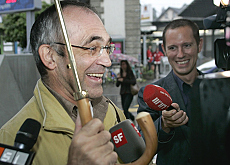
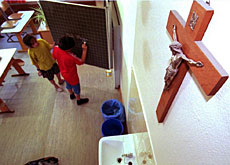
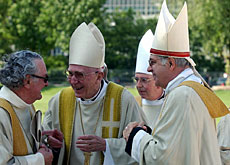
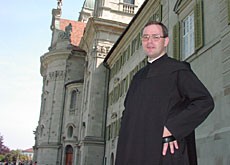
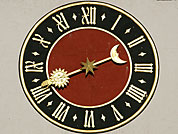
You can find an overview of ongoing debates with our journalists here. Please join us!
If you want to start a conversation about a topic raised in this article or want to report factual errors, email us at english@swissinfo.ch.